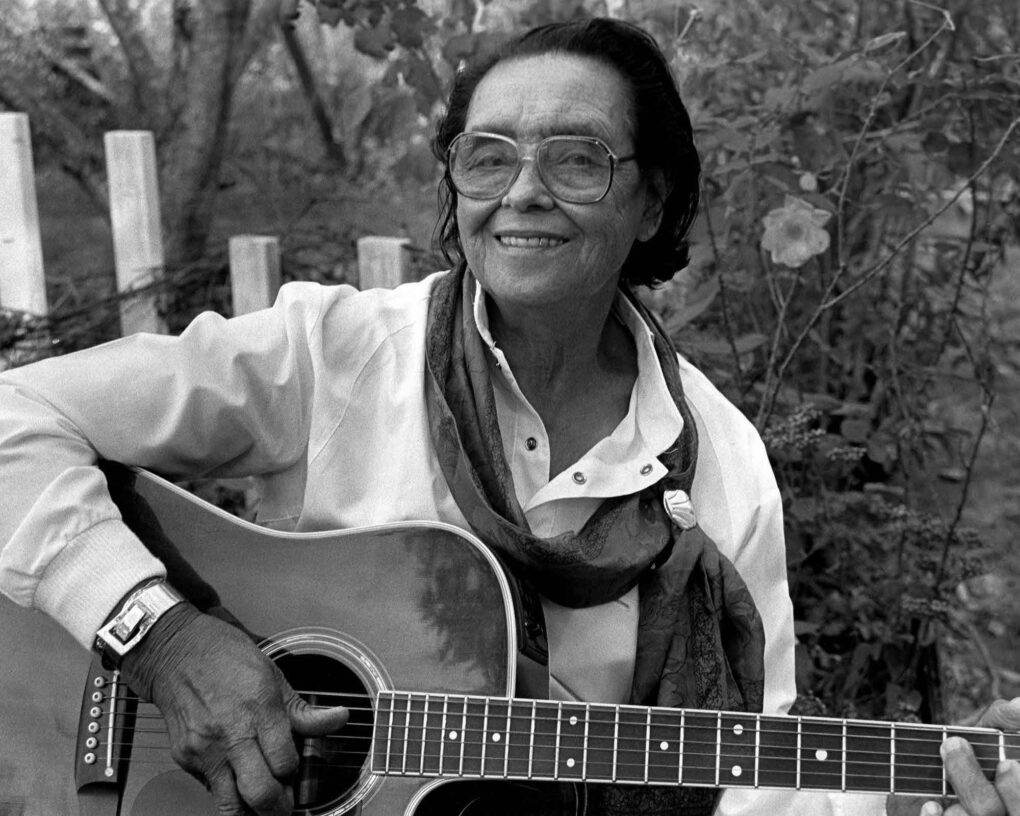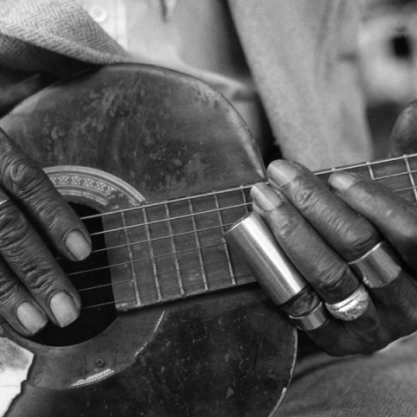Etta Baker’s Eternal Beauty

By James Calemine
“When I was young and in my prime
I always tried to be on time
But now my pace is gettin’ slower
And I don’t get around much anymore.”
–Etta Baker
Born in 1913, Etta Baker started playing guitar at age three in her North Carolina home under the guidance of her father Boone Reid, a multi-instrumentalist and Piedmont bluesman. In her nearly ninety-year career, Etta, whose heritage included African American, Native American, and European American ancestors, played guitar and banjo. All of her siblings played instruments.
Baker’s first work appeared in 1956 on Instrumental Music of the Southern Appalachians, for which she was not compensated. Music Maker Foundation helped her get paid for this album that stayed in print for 50 years. Music Maker’s Co-Founder Tim Duffy revealed how music attorney Bill Krasilovsky–Chuck Berry’s lawyer–assisted Music Maker in obtaining Etta Baker’s remuneration:
“Bill Krasilovsky called the owner of the company who reissued the record and said Etta never got paid. He did a lot of good stuff. Years later the catalog was acquired by another record company who dug up the original contract in 1956, and there was Etta’s signature. It was an old-school paragraph–five sentences. ‘I Etta Baker forgo all my rights in perpetuity of anything that can be done with this for $1.25’. She got paid $1.25! RykoDisc owned it at the time. The guy who owned the company was a good guy. He cut her a check. We advocated for Etta and got her the thousands she truly needed at that time.”
Tim Duffy discovered Etta Baker as a young man. “Etta was famous. When I was 15, I had this hippie-folkie friend with a great record collection including Music From The Hills of Caldwell County. For me, it was mind-blowing. When I was in college in 1981 there was a guy named David Holt–a famous folk musician–who brought Etta to our class. She was just amazing. Years later, in 1988, I was getting a Master’s at UNC Chapel Hill and my professor Glen Hinson knew her. The State Folklore was making a record and I went to her home to meet her.”
In 1989, Baker received the North Carolina Folk Heritage Award from the North Carolina Arts Council. In 1991, she won a National Heritage Fellowship from the National Endowment for the Arts. The same year, Baker made her first recording in years titled One Dime Blues on Rounder Records.
As Duffy’s field recording aptitude and business acumen sharpened, he worked to establish Music Maker Foundation. “In 1995, I produced a record for Cello, and I had a budget. We were able to give her a substantial advance to make a record with Taj Mahal. I started managing her. I was very involved in promoting her. Music Maker really pushed Etta internationally.”
The influential Taj Mahal said of Baker, “Because she was a stunning beauty, Etta’s husband refused to let her travel and perform away from home. She never stopped playing music! This gracious grandmother was the source of a great deal of joy and surprise when I found that she still played guitar after I heard her early recordings in the sixties. One of the signature chords of my guitar vocabulary comes from her version of ‘Railroad Bill’. This was the first guitar-picking style that I ever learned.”
Duffy shed some light on the difficult life female musicians endured, and the scarcity of their recordings. “I would say ninety percent of the bluesmen I’ve recorded and knew all told me they learned to play music from their mothers. We only really know a tip of the iceberg of Black music recorded in the South–very little has been recorded. But if you go to Black women’s music you get some gospel. If you go into the secular world there’s very little that’s been recorded.
“At the time, women weren’t pushed commercially. You have your Ma Raineys and your Bessie Smiths, but for the mothers and daughters trying to play music was a very dangerous gig. A white northern guy was not getting into those living rooms of Black ladies to record them.”
Music Maker recorded the Etta Baker albums Railroad Bill (1999), Etta Baker with Taj Mahal (2004), Carolina Breakdown with Cora Phillips (2005), Banjo (2009), and a vinyl issue of Railroad Bill (2015). Baker’s timeless “Carolina Breakdown” is featured in Music Maker’s new compendium Song Keepers: A Music Maker Foundation Anthology. Etta Baker passed away in 2006, but the beauty of her music is eternal.

Get involved
& give back
The Music Maker Foundation is a 501(c)(3) nonprofit organization that depends on thousands of supporters. Together, we work to meet the day-to-day needs of the artists who create traditional American music, ensure their voices are heard, and give all people access to our nation’s hidden musical treasures. Please contribute or shop our store today.
